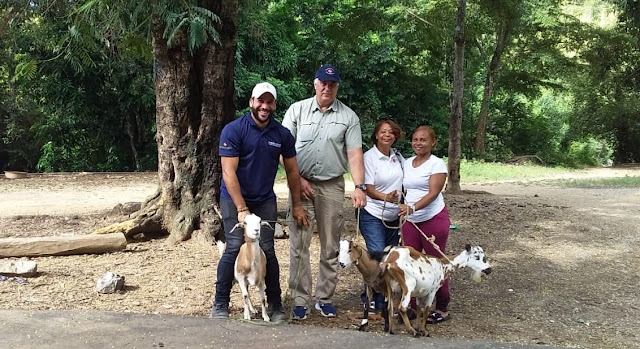Pig and Goat Production Management in the Dominican Republic
 |
| Field officer Rafael Marte, volunteer Kenneth Andreis and communitarians from Puerto Plata after receiving assistance in goat production, hygiene and feeding. |
In July 2019, the Dominican Republic’s Farmer-to-Farmer Program received two wonderful volunteers in swine and goat production management. The host, Caritas Dominicana, is an NGO created by the Conference of the Dominican Episcopate to serve the most vulnerable people and groups, with the aim of improving their living conditions and building a society based on justice, fraternity and peace.
Dr. Kenneth Andries, an Associate Dean of the College of Agriculture, Communities, and the Environment at Kentucky State University with a PhD in Animal Genetics arrived in the DR as a goat production management volunteer. And Guilherme Prezotti, a veterinarian of Brazilian origin with a Master’s degree in Animal Science from Texas Tech University, traveled to the DR to complete a swine production management assignment.
 |
| Field Officer Rafael Marte following volunteer Guilherme Prezotti instructions on how to wash pigs properly in order to improve their hygiene conditions. |
These two volunteers carried out practical workshops with trainers and farmers from all the communities where the Caritas Dominicana project is implemented, as different groups had encountered the same problems with their animals. In the northern region they worked with the communities of La Cuarenta in the province of La Vega, Ceiba de Boné in the province of Santiago Rodríguez and Sonador de Yaroa in the province of Puerto Plata. In the southern part of the country, the community of Monte Grande in the province of Barahona also received their assistance and training.
The main objective of these two assignments was to improve existing procedures and develop new practices related to pig and goat production. The volunteers trained over 100 people, with a special focus on:
- Breeds and Breeding
- Housing Facilities and Equipment
- Biosecurity Protocol
- Feeds and Feeding
- Health Care Management of the animals
 |
| Volunteer Guilherme Prezotti working with communitarians from Ceiba de Bone to improve the infrastructure of their swinery. |
These two assignments were especially successful as some of the recommendations made by the volunteers were immediately implemented and results were visible a few weeks later. Some of the most important triumphs are that the infrastructure where the pigs and goats are held were improved to ensure that the animal mortality rate went from 50% to almost zero.
Thanks to the work of these two volunteers, the benefited communities now have a selection of animals with better genetics, optimal hygiene conditions, and a higher nutritional level. This results in better quality animals and a higher profit when it comes to selling them. These two assignments helped strengthen the resilience, rural adaptation and livelihoods of these communities, by giving these farmers more and better opportunities.
 |
| The two volunteers and the Field Officer visiting farmers in Sonador de Yaroa, Puerto Plata. |

.png)

Comments
Post a Comment